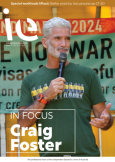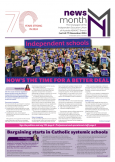
Howard Stevenson (above) is a Professor of Educational Leadership and Policy Studies in the School of Education at
the University of Nottingham. This article is an abbreviated extract from a blog published by Education International in September 2023.
There is a strong need to re-engage with the fundamental concept of dignity – for the sake of the teaching profession, writes the University of Nottingham’s Professor of Educational Leadership and Policy Studies, Howard Stevenson.
In 1968, Martin Luther King addressed striking sanitation workers in Memphis, but his words will resonate with teachers around the world today: “Whenever you are engaged in work that serves humanity and is for the building of humanity, it has dignity and it has worth.”
Tackling what UNESCO [United Nations Educational, Scientific and Cultural Organization] has called “the global crisis in teacher supply”, as set out in the mandate given to the UN High-Level Panel on the Teaching Profession, we must return to the concept of dignity – something teachers in many parts of the world do not believe they experience in their work.
Dignity is inevitably a complex concept, but in the thematic background paper I prepared for the UN High-Level Panel, I argue that it rests, fundamentally, on three foundational elements: recognition, agency and rights.
The problems experienced today in relation to teacher supply exist because in many contexts these foundational elements of dignity have been progressively eroded.
Recognition is not limited to material factors, but remuneration and working conditions are tangible reflections of recognition.
Teachers losing agency
In many jurisdictions, teachers are paid less than average graduate earnings, and working conditions are poor. In relation to both factors, there is clear evidence of a poor situation deteriorating.
However, the trends in relation to agency and professional autonomy are, if anything, more dramatic.
Teachers find themselves subject to increasing levels of prescription and surveillance, with diminished capacity to act in ways that acknowledge professional experience and expertise.
High-trust environments are being replaced by low-trust systems and the growth of cultures of compliance.
Furthermore, the rights that are essential to protecting teachers’ access to good working conditions and professional autonomy are also being undermined. Not always, and not everywhere – but in far too many places.
Giving teachers a voice
In my contribution to the UN High-Level Panel on the Teaching Profession, I provide a conceptual framework for thinking about how re-engaging with the concept of dignity can help make teaching the job it deserves to be – working in the best interests of students, as well as making teaching an attractive job for prospective educators.











































































































































